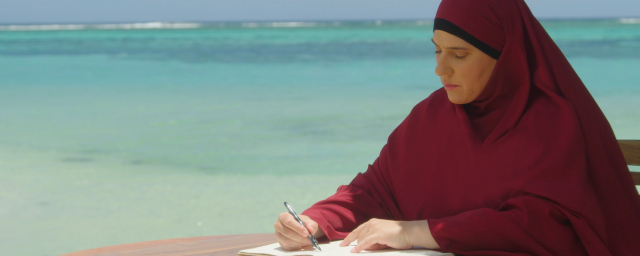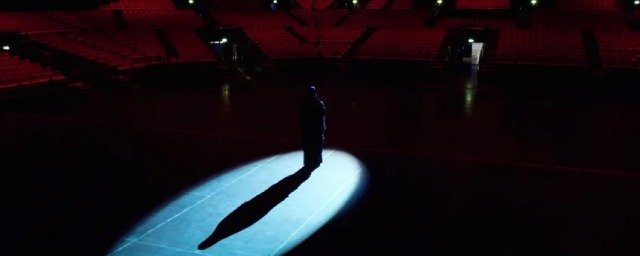After a presentation at the Cannes Film Festival, the documentary Salam is entitled to an exceptional theatrical release. Anne Cissé, one of the directors, talked about her meeting with Diam’s and how the film came to be.
It was one of the documentaries event of the 75th edition of the Cannes Film Festival: Salam benefits from an exclusive cinema release on July 1 and 2 before being posted on the BrutX platform at the start of the school year.
Years after ending her musical career, Mélanie (Diam’s) chooses to tell with an open heart about his moments of glory, his moments of doubt, his failures, psychiatry, the search for a meaning to give to life and his conversion to Islam. She tackles tough topics, talks about depression, suicidal thoughts and media pressure.
To tell this path to inner peace and this transition to this new existence far from glitter and showbiz has definitely turned the page, Diam’s worked with Houda Benyamina (Divines, The Eddy) and Anne Cisse (Vampires) who wrote and directed this documentary produced by Black Dynamite and Brut. Met in Cannes, director and screenwriter Anne Cissé tells us about this long-awaited project and what Diam’s wanted to convey to its audience through this documentary.
AlloCiné: What prompted Mélanie (formerly Diam’s), now very discreet, to embark on this documentary project?
Anne Cissé: Mélanie explained to me that it had been ten years since producers approached her to make fiction around her story. They evoked films or series and I think that she was not yet ready to see someone else take hold of this story there. Often, when we offered her this kind of project, we were content to tell the story of the rapper who stops after the conversion.
And she wanted to tell the post-conversion story, where things happen that are very rarely shown. When producers came to offer her a project where she had carte blanche, she accepted. But she didn’t know how to make films, so she met Houda Benyamina through her friend Adèle Exarchopoulos. And I arrived on the project to structure the story, being a screenwriter and director. And since we got along very well, we decided to co-direct this documentary.
Even if the documentary does not return in detail to his musical career, there are passages that return to his relationship with his fans, his awards and his concerts. Was it important not to minimize this major part of his story?
Mélanie does not deny Diam’s at all, it’s part of who she is. I think she’s happy to have gone through what she went through and to have gone through all that with an audience that loved her very much, who still loves her. The first thing she told me was that she wasn’t very active on social media but she talks with a lot of people privately. Public support is dear to him.
It was this feeling that she rediscovered when we shot in the Zénith concert hall which was more pleasant to her than when we went back to her trophies, which represent more the music industry, which was something more painful for her. But we still feel that the page has been turned and that there are no regrets or grudges or remorse.
Black Dynamite / Raw / M by M
In addition to the Zenith concert hall, you often place Mélanie (Diam’s) in large spaces or large expanses like the desert, throughout the documentary, where we see her walking and moving from dark places to brighter places. With this staging, you represent his thought process.
Yes, the documentary is made up of two parts. The first part is very dark since we talk about psychological suffering, subjects she had never discussed with her mother. Very quickly, the film opens up to brighter expanses and this bias is explained by the fact that Mélanie is very connected to nature. She talks about religion and Islam but above all she talks about spirituality.
She found it in Islam but you can find it anywhere. She wanted to take the public to places that touched her. And if we put her alone and small in these big spaces, it’s because she finally became very small, she went from star to anonymous, a private and simple person.
When you discussed the topics she wanted to cover in the documentary, did Melanie impose limits or veto certain aspects of her life?
No, she wanted to raise issues of psychological suffering. It was important for her because she receives messages from people in pain who call her for help, like when she was Diam’s. She wanted to say with this film “I’m here, I understand, I’ve been there and we can get by.” She doesn’t say that her path is the right one or that everyone has to follow her, but that everyone can find their own path. She didn’t want to treat her discomfort superficially.
She has always approached it in a more or less gentle way in her songs, like in “TS” where we understand that she made a suicide attempt. I was there when she was talking with her mother and you have to imagine that Diam’s was doing a concert in the evening and finding herself confined the next day with her face scarred. It was important for her to address these hard things that happened to her to explain that we can get out of it but that it can happen to anyone.
She’s still an artist. That’s what surprised me when I met her. Diam’s left the stage but Mélanie is an artist at heart. She has always written, she is very poetic. And in some of the interviews, I think she doesn’t even realize that she’s almost slamming, chanting her words. It’s very natural and she was not Diam’s by chance.
There are also a lot of testimonies in the documentary from people close to Mélanie, who are not used to speaking and who put themselves on stage with only their faces illuminated. Has Mélanie chosen her speakers?
Yes, she wanted to make those who were present and who lived things with her speak, and not the friends of the occasion. She chose people who held a secret. When I conducted the interviews, everyone was very moved. I had had them on the phone before and that’s also why the bias of chiaroscuro is that we wanted to plunge the entire technical team into darkness to have an atmosphere conducive to conversation and the collection of the speech.
And then we realized during the editing that a lot was going on with the faces, so we wanted to focus on that. And since they speak before Melanie, it was also a way to make people forget their veil. As we are used to being focused on the faces thanks to this staging and this editing, we forget Mélanie’s veil when it is up to her to speak.

Black Dynamite / Raw / M by M
The documentary has a certain musical rhythm with Mélanie’s voice narrating and almost slamming over the images. Was it voluntary?
She’s still an artist. That’s what surprised me when I met her. Diam’s left the stage but Mélanie is an artist at heart. She has always written, she is very poetic. And in some of the interviews, I think she doesn’t even realize that she’s almost slamming, chanting her words. It’s very natural and she was not Diam’s by chance.
She wanted to speak again with a voiceover. It’s also easier for her, I imagine, to comment on the images rather than being in front of the camera. The voice-over allowed him to give free rein to his poetry, his reverie and his emotion. Even if she was very generous in the interviews.
Have you thought about discussing more political subjects? She was the voice of a whole generation in a certain political context, but she could still be today. His songs are often brought back to the fore in periods of crystallization in French society.
Mélanie now lives in a private sphere, she doesn’t want to make waves. He is someone who is in appeasement and rather in reconciliation. She wants people to talk to each other. For example, my mother is a fan and when she saw the film, she told me “I can’t find her anymore, she who was so angry”. And I told him that was fine.
I spoke to Mélanie about it and she was happy that she noticed this change. She wants to create dialogue, she does not seek to create controversy. With this film, she found the right setting to promote this dialogue and deliver her word without it being interpreted. I hope and believe that youth has other contemporary icons.
Interview by Mégane Choquet on May 27, 2022 in Cannes.

